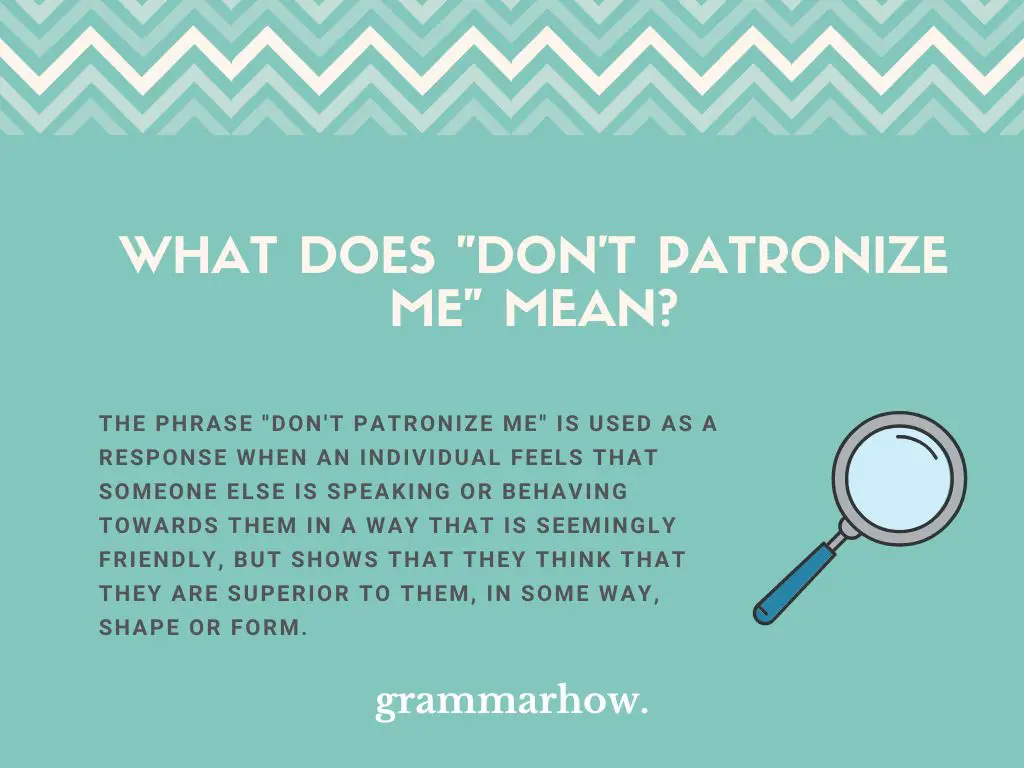The phrase “don’t patronize me” can often be heard during conversations in the workplace, in school, or amongst colleagues. However, with the term “patronize” having dual meanings, it can often come across as confusing when used. Therefore, this article will highlight the meaning, when used in this particular phrase.
What Does “Don’t Patronize Me” Mean?
The phrase “don’t patronize me” is used as a response when an individual feels that someone else is speaking or behaving towards them in a way that is seemingly friendly, but shows that they think that they are superior to them, in some way, shape or form.

Because of this, their actions or opinions have come across in a condescending manner, as opposed to being helpful. Therefore, the phrase “don’t patronize me” can often be used as an applicable response.
As we can see when looking at Cambridge Dictionary, the term “patronize” is defined as speaking to or behaving towards someone as if they are stupid or not important or treating others in a manner that shows that you consider yourself better than they are.
Because of this, when someone is “patronizing” another individual, regardless of how nicely they are attempting to do so, it can come across as being incredibly negative, unnecessary, or rude.
How To Use “Don’t Patronize Me” In A Sentence
We will now be going over some examples that showcase how the phrase “don’t patronize me” is used appropriately in a sentence. Considering that this phrase is commonly used in conversation, the examples that will be shown will reflect that.
Examples:
- Cashier: Sir, you need to insert your debit card into the chip reader, before we can complete your transaction.
- Gentleman: Please, don’t patronize me! I am well aware of how this machine works.
- Professor: First, you’ll need to search for the word in the dictionary.
- Teacher’s Assistant: Don’t patronize me, I understand exactly what I need to do.
- Molly: You need to kick the soccer ball with the inside of your foot, not your toes!
- Joe: I have played soccer for longer than you have, so don’t patronize me!
- Wife: Make sure to retrace your steps and check your coat pockets.
- Husband: Please, don’t patronize me! I know how to find my own keys.
- Sarah: You need to listen to our boss, he is in charge after all!
- Todd: Sarah, don’t patronize me! I understand that he is in charge!
- Mom: You need to put on your boots, hat, and coat – it’s cold today.
- Teenager: Mom, don’t patronize me – I know how to dress when going outside in the winter.
- Boss: You need to fix our computer software and figure out where this virus came from.
- Software Technician: Please, don’t patronize me, as I know what needs to be done.
Is “Patronize” Positive Or Negative?
The individual term “patronize” can be considered both positive and negative. This has much to do with the fact that the term “patronize” has dual meanings. In a positive sense, the term “patronize” means to frequent a place of business, like a restaurant or store, as a routine customer.
However, in regards to a negative sense, the term “patronize” means to offer advice or input in a way that comes across as having an air of condescension or superiority. This is often done unintentionally or in an attempted polite way, however, it is often unwarranted and therefore, comes across in a negative way to the recipient.
“Don’t Patronize Me” – Synonyms
As the phrase “don’t patronize me” is common and can come across as a somewhat snippy or snarky response, it is important to be aware of alternative phrases that are applicable. We will now go over examples of synonymous phrases that can be used in place of “don’t patronize me”.
- Don’t condescend to me.
- Don’t talk down to me.
- Don’t treat me as your inferior.
- Don’t treat me like a child.
- Don’t look down your nose at me.
Finals Thoughts
The phrase “don’t patronize me” is a direct response to being made to feel inferior or lesser than someone else. Often, we will use this phrase when someone’s tone or advice has come across as being snobbish, elitist, or supercilious – regardless of the intent behind it.

Martin holds a Master’s degree in Finance and International Business. He has six years of experience in professional communication with clients, executives, and colleagues. Furthermore, he has teaching experience from Aarhus University. Martin has been featured as an expert in communication and teaching on Forbes and Shopify. Read more about Martin here.
